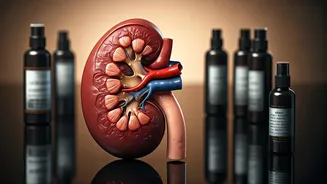Dyeing: Risks Unveiled
Hair dyes, a staple in personal grooming, can present hidden health risks. Certain chemicals found in these products have the potential to negatively impact
kidney function. Prolonged or excessive use of hair dye can heighten the risk of kidney damage, leading to health complications. The kidneys, responsible for filtering waste and toxins from the blood, are vulnerable to the harsh chemicals present in many hair dyes. The potential for harm emphasizes the need for caution and awareness when using these products. Understanding these risks is crucial for making informed choices regarding hair care and overall health. Taking proactive measures can protect kidney health while still allowing for personal style and expression. It's imperative to recognize that while hair dye can enhance aesthetics, it may also carry hidden dangers that require careful consideration and protective strategies.
Ingredients to Avoid
Specific ingredients found in hair dyes are of particular concern regarding kidney health. Certain substances, such as paraphenylenediamine (PPD), a common dye component, and ammonia, can be harmful. These chemicals have been linked to allergic reactions and, in severe instances, kidney damage. When selecting hair dye products, it's essential to carefully review the ingredient list. Look out for and avoid products containing high concentrations of potentially harmful chemicals. Moreover, conducting a patch test before applying the dye to the entire head can help detect allergic reactions and reduce the risk of adverse health effects. Prioritizing products with fewer harsh chemicals and opting for gentler alternatives, such as those with natural ingredients, can also help mitigate the risks associated with hair dye. Being mindful of these details empowers individuals to make informed and health-conscious decisions when dyeing their hair.
Safety Tips: Essential Steps
Minimizing the risks associated with hair dye requires implementing several safety measures. Before application, conduct a patch test by applying a small amount of the product to an inconspicuous area of the skin to check for allergic reactions. Always wear gloves to prevent skin contact and potential chemical absorption. When mixing and applying the dye, work in a well-ventilated area to minimize inhalation exposure. Always follow the manufacturer's instructions carefully. Avoid leaving the dye on your hair longer than recommended. Rinse your hair thoroughly after dyeing to remove any residue. Furthermore, consider opting for hair dye products that are labeled as 'low chemical' or 'natural' to reduce exposure to potentially harmful substances. By adhering to these safety guidelines, individuals can reduce potential health risks while still enjoying the benefits of hair coloring.
Protecting Kidney Health
Beyond using hair dye safely, maintaining good kidney health is paramount. Ensure adequate hydration by drinking plenty of water daily to support kidney function. Maintain a balanced diet, limiting processed foods and focusing on fresh fruits, vegetables, and lean proteins. Regular physical exercise is also beneficial for overall health, including kidney health. If you have any existing kidney conditions, consult a healthcare professional before using hair dye to assess any potential risks and discuss any necessary precautions. Routine health checkups can help detect any early signs of kidney issues. Early detection enables timely intervention and treatment. By practicing a holistic approach to wellness that incorporates safe hair care practices and kidney health-promoting habits, you can take control of your well-being. Prioritizing kidney health, while considering the use of hair dye, is vital for maintaining a healthy and vibrant life.



















